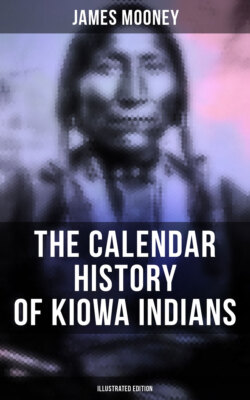Читать книгу The Calendar History of Kiowa Indians (Illustrated Edition) - James Mooney - Страница 64
На сайте Литреса книга снята с продажи.
Release of Set-t'aiñte and Big-tree, 1873
ОглавлениеTable of Contents
Photo by Soule, about 1870.
Fig. 50—T'ené-angópte or Kicking-bird.
The principal event of 1873 was the release and return to their people of the chiefs Set-t'aiñte and Big-tree, who had been imprisoned in Texas under jurisdiction of the state authorities (see the calendar). On the assurance given to the delegates in Washington that their chiefs would be restored to them in the spring, provided the tribe remained peaceably on the reservation in the meantime, the Kiowa had conducted themselves properly through the winter. With spring, however, came the Modok war, with the killing of General Canby, which created such a distrust of Indians in general that the people of Texas were unwilling to surrender the prisoners, whom they regarded as hostages for the safety of the frontier. Notwithstanding their disappointment, the Kiowa remained quietly at home, patiently waiting until the government should bring influence to bear on the governor of Texas to redeem its promise. The prisoners, accompanied by Governor Davis of Texas and the Indian Commissioner, were at last brought to Fort Sill, where a council was held with the Kiowa in October. At the opening of the council the governor of Texas made a number of hard demands as preliminary to the surrender of the chiefs, although the government had already promised their unconditional release in consideration of the good conduct of the tribe during the last year. Some of these conditions were practically impossible, and for a time it seemed as if the whole purpose of the negotiations would be defeated, Kicking-bird, the leader of the friendly element, declaring that the government had lied and that the white man was no longer his friend, while Lone-wolf threatened war even though it should mean the destruction of their people. It became evident that there would be a desperate encounter if the chiefs were not now set free as promised, and on the earnest representations of the Indian Commissioner the governor finally yielded in his demands, and Set-t'aiñte and Big-tree were released from custody on October 8, 1873, subject, however, to rearrest by the state of Texas whenever it should appear that any of the Kiowa had again been raiding there. Although this condition was in violation of the promises made by the government, the Indians were compelled to be satisfied. An unsuccessful attempt was made by the governor to force the Comanche, by the delivery of hostages, to similar conditions. To show their good will, however, a party of Comanche volunteered to assist a detachment of troops in bringing in any of their young men who might then be raiding in Texas. During their absence on this errand a party of Texans visited the reservation and ran off two hundred horses and mules (Report, 32; Battey, 1).
The Quaker teacher, Battey, who was present during the council, thus describes the release of the chiefs:
Satanta and Big Tree, after embracing the governor, proceeded to embrace the chiefs present, and immediately returned with them to the agent's office, from whence they went to their rude home in their camps. The reunion of these chiefs with their tribe and families was impressive and affecting in the extreme. Joy beamed upon every countenance, and their happiness was exhibited, as might be expected, in the most wild and natural manner.
Reports continued to fill the newspapers of renewed raids into Texas by Set-t'aiñte and Big-tree, when Battey asserts—
To my certain knowledge the latter was at home, sick in his lodge, and the former enjoying, after two years' confinement in prison, the pleasures of the buffalo chase, on territory assigned for the purpose (Battey, 2).
